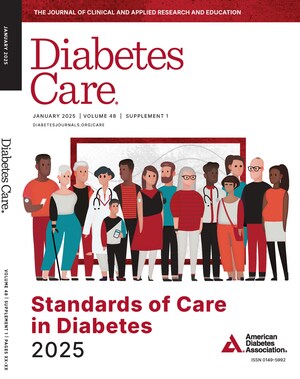ALEXANDRIA, Va., March 23, 2016 /PRNewswire-USNewswire/ -- In a landmark advancement for preventive health care and the 86 million Americans currently most at risk of developing type 2 diabetes, Health and Human Services Secretary Sylvia Mathews Burwell today announced the National Diabetes Prevention Program (National DPP) will be eligible for Medicare coverage. This is the first time since the passage of the Affordable Care Act six years ago that a preventive health program has become eligible for expanded coverage under Medicare. The American Diabetes Association applauds today's announcement, which noted that new regulations to expand coverage of the National DPP for Medicare beneficiaries will be rolled out later this year by the Centers for Medicare and Medicaid Services (CMS).
The American Diabetes Association has long supported the National DPP, a network of community-based, lifestyle intervention programs administered by hospitals, health care centers and community organizations that meet Centers for Disease Control and Prevention (CDC) standards. Sec. Burwell revealed data produced by a 2012 Health Care Innovation Award (HCIA) grant, from the Center for Medicare and Medicaid Innovation (CMMI) to the YMCA, confirming the significant health care savings of the National DPP. During the 15-month period of the program, Medicare saved $2,650 for each person enrolled.
"The Association has spent the last eight years diligently advocating for Medicare coverage of the National DPP, and today's announcement is a powerful endorsement of the value of preventive health care for people who are at risk of developing type 2 diabetes," said Kevin L. Hagan, chief executive officer for the American Diabetes Association. "The evidence shared today confirms the National DPP delivers cost savings to individuals who are at risk for developing diabetes and to our health care economy. Most importantly, the National DPP showed improved health outcomes for participating individuals, demonstrating that interventions like the National DPP can help prevent many of our country's seniors from developing type 2 diabetes and its horrible complications, which can include blindness, amputation, heart disease, stroke and kidney failure."
The CDC estimates that, if current trends continue, one in three American adults could develop diabetes by 2050. More than 29 million adults and children in the U.S. have diabetes, representing 9.3 percent of the population. Every day, more than 3,700 people are diagnosed with diabetes in the U.S., the equivalent of about one new diagnosis of diabetes every 23 seconds. In addition, 86 million Americans have prediabetes, a condition that can lead to type 2 diabetes. Fifteen to 30 percent of people with prediabetes will develop type 2 diabetes within five years of a prediabetes diagnosis unless they participate in intensive, early intervention such as the National DPP.
The potential for Medicare coverage expansion announced today by Sec. Burwell achieves the goals of the Medicare Diabetes Prevention Act of 2015 (S. 1131/H.R. 2102), introduced by Senators Al Franken (D-MN), Susan Collins (R-ME), and Charles Grassley (R-IA) in the Senate, and Representatives Susan Davis (D-CA) and Peter King (R-NY) in the House of Representatives.
"Thank you, Sec. Burwell, for your leadership today, and thank you Sens. Franken, Collins and Grassley, and Reps. Davis and King, our long-time champions for diabetes prevention and care," continued Hagan. "Making the National DPP accessible to Medicare beneficiaries is an important step in our shared national imperative to end the diabetes epidemic."
The HCIA grant of $12 million over three years from CMMI covered the costs for qualified Medicare participants (adults age 65 or older, screened for and diagnosed with prediabetes) to complete this lifestyle intervention at one of the YMCA's 17 participating community centers. The CMMI grant to the YMCA was the first ever investment by CMS to test the success of a community-based diabetes prevention program.
"Approximately one in two seniors has prediabetes, and early intervention is critical to preventing or delaying the onset of type 2 diabetes. Medicare coverage of the National DPP, including the YMCA's program, will provide critical access to an intervention that can reduce the risk for our nation's seniors," said Robert E. Ratner, MD, chief scientific and medical officer for the American Diabetes Association. Ratner served as the lead investigator at Medstar Research Group, one of the participating centers for the Diabetes Prevention Program Research Group's historic clinical trial, which led to the creation of the National DPP.
In 2002, the Diabetes Prevention Program Research Group's randomized clinical trial, "Reduction in the Incidence of Type 2 Diabetes with Lifestyle Intervention or Metformin," also known as the Diabetes Prevention Program (DPP), demonstrated that intensive lifestyle intervention was effective and successfully reduced risk for developing diabetes by 58 percent for the entire study population; and for those over the age of 60, risk for diabetes was reduced by 71 percent.
These powerful findings were later translated to a community classroom setting, where lifestyle interventions were replicated at a lower cost. This led to the creation of the National DPP, which is overseen by the CDC. The National DPP consists of an intensive, 12-month, evidence-based intervention program that includes 16 weekly core sessions followed by monthly maintenance sessions. Delivered in a classroom setting by trained coaches, the National DPP provides a supportive, small group environment to promote healthier eating habits and increase physical activity, with goals of reducing body weight by 5 to 7 percent and increasing physical activity to 150 minutes per week. In 2010, the National DPP was authorized by Congress as part of the Affordable Care Act to build an infrastructure of programs across the country. The cost to participate in the National DPP is not currently covered by Medicare. Today's announcement creates the pathway for Medicare to cover National DPP certified programs, thereby opening access to millions of Americans at risk for type 2 diabetes.
Health care costs for people with diabetes are 2.3 times higher than for individuals who do not have diabetes. In 2012, the cost of diagnosed and undiagnosed diabetes and prediabetes escalated to $322 billion, a 48 percent increase in just five years. This equates to one in every 10 health care dollars being spent treating diabetes and its complications, and one in five health care dollars being spent to care for people with diabetes. For Medicare beneficiaries, the numbers are greater, with one in every three Medicare dollars spent on care for people with diabetes.
For more information about diabetes and information about prevention programs, visit diabetes.org.
About the American Diabetes Association
The American Diabetes Association is leading the fight to Stop Diabetes® and its deadly consequences and fighting for those affected by diabetes. The Association funds research to prevent, cure and manage diabetes; delivers services to hundreds of communities; provides objective and credible information; and gives voice to those denied their rights because of diabetes. Founded in 1940, our mission has been to prevent and cure diabetes, and to improve the lives of all people affected by diabetes. For more information please call the American Diabetes Association at 1-800-DIABETES (1-800-342-2383) or visit diabetes.org. Information from both sources is available in English and Spanish.
Logo - http://photos.prnewswire.com/prnh/20141105/156803LOGO
SOURCE American Diabetes Association
Related Links
WANT YOUR COMPANY'S NEWS FEATURED ON PRNEWSWIRE.COM?
Newsrooms &
Influencers
Digital Media
Outlets
Journalists
Opted In






Share this article